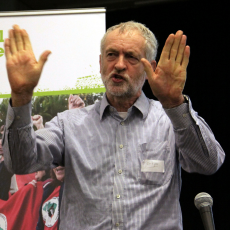
This time last year hardly anyone outside his own parliamentary constituency of North Islington had ever heard of Jeremy Corbyn. But with his victory in the Labour leadership election in September last year, a few months after the Labour party suffered one of its worst General Election defeats under Ed Miliband, the political beliefs of Jeremy Corbyn have become an important matter for those both on the left and the right wings of politics. So, what are Jeremy Corbyn’s politics?
To put simply, Jeremy Corbyn is a democratic socialist and therefore much, if not all, of his politics stems from this ideological starting point. In regard to economics, Corbyn believes that some industries should be nationalised - that is, bought by the nation state and taken into public ownership, a popular socialist policy. Industries which he thinks are suitable for nationalisation include the railway system (British Rail) and energy companies. He is also a strong supporter of the publicly owned National Health Service, which provides healthcare for everyone, free of charge.
Added to this he believes that the rich (those earning over £150,000 a year) should pay a higher rate of tax than they pay (currently 45% of what they earn). But it seems his main desire in relation to tax is to get large businesses, such as Amazon and Google, to pay their fair share of corporation tax in Britain. Another economic policy of his which has been much talked about is People’s Quantitative Easing, whereby the government has the Bank of England print money for the government to then invest in public infrastructure, like housing and roads.
When it comes to foreign policy, Jeremy Corbyn is a strict anti-imperialist and therefore has consistently protested against British foreign intervention in the Middle East over the last fifteen years. He is one of the key members of the Stop the War Coalition. He has also expressed a strong dislike for the North Atlantic Treaty Organization (NATO), stating that rather than protecting its member states, “It makes the whole world infinitely more dangerous.” Added to this, he is a passionate advocate for the disarmament of Britain’s nuclear weapons and therefore against the replacement of Trident – Britain’s current nuclear weapons system.
Free tuition for higher education, such as for those studying at university, is another policy Jeremy Corbyn supports, along with the bringing back of maintenance grants for poor students. On LGBT issues, he favoured the legalising of same-sex marriages and has supported the gay community throughout his time as a Member of Parliament (MP).
Before he became an MP, he worked for a time with trade unions and is opposed to the Trade Union bill which aims to reduce the influence of the unions. He has also stated that if he becomes Prime Minister he would change striking rules to empower trade unions to strike in more scenarios than they currently can.
Furthermore, in spite of voting against joining the European Union (EU) in the UK’s 1975 European Union referendum, Jeremy Corbyn has recently made clear that he as the Labour leader will campaign for Britain to remain in the EU come Britain’s referendum on it membership, which is expected to occur sometime this year.
So, that is a rough picture of what Jeremy Corbyn, the leader of the Labour party, stands for.
Image: By Global Justice Now (Jeremy Corbyn) [CC BY 2.0 (http://creativecommons.org/licenses/by/2.0)], via Wikimedia Commons

0 Comment:
Be the first one to comment on this article.